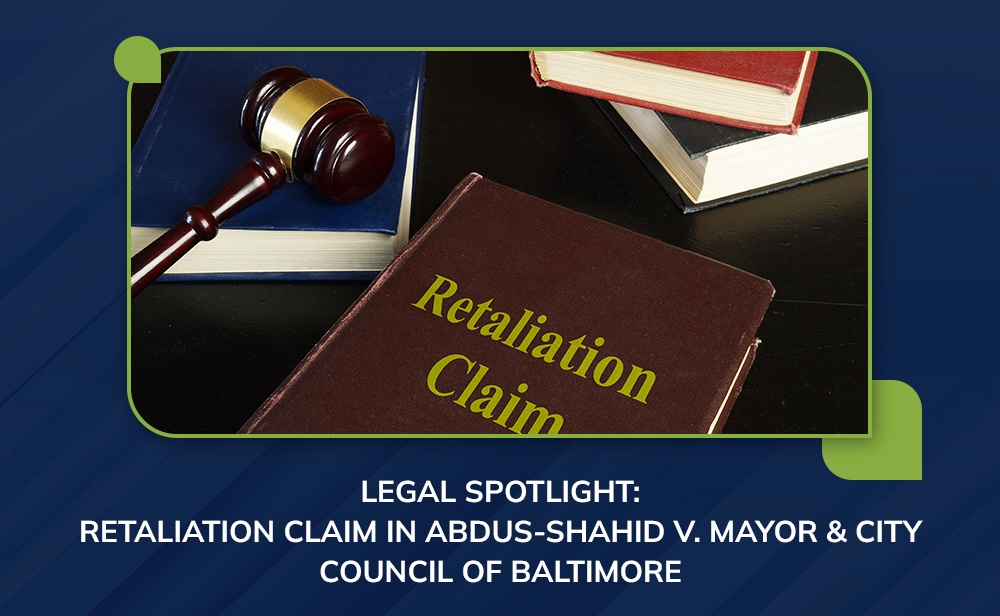Legal Spotlight: Retaliation Claim in Abdus-Shahid v. Mayor & City Council of Baltimore

In the recent federal court decision of Abdus-Shahid v. Mayor & City Council of Baltimore, the court approved a retaliation claim to move forward into discovery after finding sufficient facts to establish unlawful retaliation as alleged, and while the employee involved continued to work.
The Court held that while individual retaliation events cited may be difficult to prove, as well as had not yet resulted in a termination, that three specific events, taken together, amounted to a plausible claim of illegal retaliation to move forward. Mem. Op. Civil No. ABA-22-2367 (filed Feb. 12, 2024) (J. Abelson).
I. Factual Overview:
Mr. Abdus-Shahid is alleged to be a construction supervisor for the Department of Transportation of Baltimore City, Md., and both African-American and Muslim. The trouble began, he alleges, when his Indian Hindu supervisor denied "out-of-title pay" to him, usually provided when someone takes on extra job responsibilities, without promotion, as he did. Mem. Op. pp. 1-2.
While it is not clear whether Mr. Abdus-Shahid only alleged religious discrimination, or some combination of racial and religious discrimination or more, it is clear that he opposed discrimination, raised concerns about it through various workplace mechanisms, and pursued it at the EEOC and participated in an EEOC investigation, starting in early 2021 well into 2022, for over a year. The EEOC closed its investigation in June 2022. Mem. Op. pp. 2-4.
Of course, this summary is based on allegations, not proven facts, in the Court's preliminary evaluative review.
II. On Retaliation:
In a retaliation claim, a litigant must allege that he or she has complained about or opposed discrimination at work in good faith. The litigant does not need to prove the discrimination occurred. This is called protected activity.
Protected activity is divided in the law between opposition to discrimination, and participation in an EEOC investigation or other governmental formal process, and both occurred here. 42 U.S.C. § 2000e–3(a); see also, e.g., Holloway v. Maryland, 32 F.4th 293, 299-300 (4th Cir. 2022); Netter v. Barnes, 908 F. 3rd 932 (4th Cir. 2018).
Here, the litigant brought claims under Title VII of the 1964 Civil Rights Act, as amended, and 42 U.S.C. § 1981, which were construed together for the purposes of the Court's preliminary review, pursuant to the CIty's motion to dismiss. Mem. Op. p. 6.
As the Court states:
"The antiretaliation provision of Title VII extends to 'employer actions that would have been materially adverse to a reasonable employee or job applicant.' Id. Employer actions are materially adverse when they are 'harmful to the point that they could well dissuade a reasonable worker from making or supporting a charge of discrimination.'"
Mem. Op. p. 7 (quoting and citing Burlington N. & Santa Fe Ry. Co. v. White, 548 U.S. 53, 64 (2006)).
III. Court's Decision:
In terms of retaliatory actions, the Court found retaliation was plausibly alleged due to three actions reviewed together.
The Court noted that the supervisor in question (1) skipped grievance meetings in 2021, meetings that might have resolved this matter rather than have it germinate, continue, and blossom into a lawsuit. Likewise, (2) the same supervisor suspended Mr. Abdus-Shahid twice in September 2021, both of which were reversed upon review, evidencing at least at this preliminary stage they were not based on workplace rules and procedure, but other (possibly retaliatory) motives, because they appeared to be deemed unfounded upon review.
Third, (3) Mr. Abdus-Shahid was reassigned to work alongside an employee whom Mr. Abdus-Shahid complained had discriminated against him beforehand. Mem. Op. p. 7-8. In sum, the Court found that taken together, it 'would would 'dissuade a reasonable worker from making or supporting a charge of discrimination' depends on the circumstances [and] context matters.'" Mem. Op. p. 8 (citing Burlington, supra, 548 U.S. at 69). As a result, the lawsuit can go forward into discovery.
IV. Takeaways:
If there is a takeaway here, it is that careful preparation is key to success in employment litigation. Second, an administrative action that is reversed creates an appearance of impropriety at the preliminary review stage of a lawsuit. Third, this matter could have been resolved before a lawsuit, but the grievance and other processes within the City did not work to resolve the dispute during 2021 or 2022.
Gregg H. Mosson, Esq.
Mosson Law, LLC
ABOUT: Our founder and experienced attorney, Mr. Mosson, focuses on representing employees in claims of illegal discrimination, illegal retaliation, disability rights violations, FMLA interference, wrongful terminations, and when seeking owed wages. He also serves people seeking disability benefits from Social Security. His experience and knowledge in these areas of the law are vast and helpful to the clients he represents. For more details, visit the Web site at www.mossonlaw.com. To contact us, you can click here or call 443-226-0601.